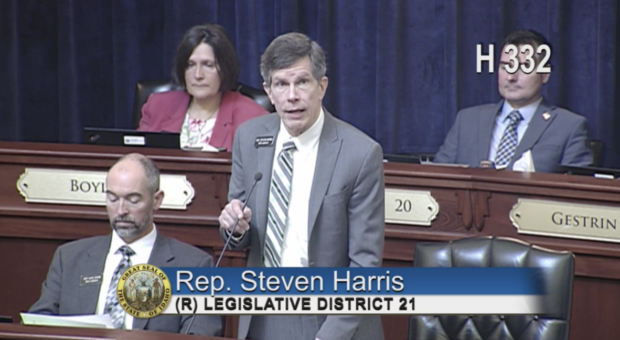
The House Wednesday passed a $389.4 million tax cut and rebate bill, after debate that cut along party lines. The bill now heads to the Senate.
House Bill 332 would do two things:
- It would reduce all income tax brackets permanently, a $169.4 million tax cut.
- It would provide Idahoans with one-time rebates — of $50 per person or dependent, or 9 percent of 2019 income taxes, whichever is greater. The rebates carry a $220 million price tag.
Co-sponsor Steven Harris, R-Meridian, called the bill “perhaps the largest tax relief in Idaho’s history.”
Democrats argued that the bill could jeopardize federal dollars to the states, provide limited relief to low-income Idahoans, and give away money the state needs for infrastructure and education without addressing larger concerns about property taxes.
Republicans, who passed the bill on a party-line 58-12 vote, argued the bill provides an equitable return to all Idahoans from state reserves. Idaho is running a record surplus projected at about $600 million.
The tax bill is important for education because it could directly impact state funding. Education receives roughly 60 percent of Idaho’s general fund budget. Sales and income tax make up general fund dollars.
In a Tuesday news release, the Idaho Center for Fiscal Policy said the bill would reduce state revenue by $160 million to $170 million on an ongoing basis, after the initial $386 million cost in fiscal year 2022.
The center also wrote that enacting the tax cut now could impact federal fiscal aid from the American Rescue Plan, reducing Idaho’s expected $1.2 billion allocation by about $800 million. Other states have hit pause on enacting tax cuts until they learn more about how those changes could affect federal funds, the center said.
Rep. Colin Nash, D-Boise, said Idaho could use federal funds to invest in water projects and broadband projects and urged the House to wait.
Republicans hit back, calling the federal aid money the “Destroy America Plan.” Greg Chaney, R-Caldwell, threatened to appeal any potential holdback to the Supreme Court, saying Idaho is being hamstrung by “fiscal federalism.”
Harris said the state only intends to give back money already in state coffers, collected from Idahoans.
“I can’t imagine the argument I would have to make to say: ‘Well, forgo providing tax relief to our citizens, because it might jeopardize federal free money coming into states,'” Harris said. “That would be an argument I wouldn’t dare to make.”
Boise Democrats argued the bill doesn’t provide property tax relief that Idahoans have been asking for, and by giving away funding for things like education could actually put even more of a burden on property taxes by forcing schools to ask for levies.
“The consequences of this bill is the money associated with the tax relief is denied to the citizens of this state, which includes funding the vital services of this state and its functions, like education,” said Rep. Steve Berch, D-Boise. “When we don’t adequately fund education, and take money that we do have available, and spend it elsewhere that pushes that cost onto property tax increases.”
A bill co-sponsor, House Majority Leader Mike Moyle, R-Star, pushed back on what he called the “perception that we should raise your income taxes to pay your property taxes.” He also argued that low-income earners would still benefit from the bill, saying that Idahoans who pay nothing in state income tax would still get some money back.
“This is the best way to give back all the extra money that we have now and do it in an equitable way where everybody benefits,” Moyle said. “I hope from this debate that we’ve learned when we talk about taxes it’s not just black and white. There’s a lot of gray and there’s a lot of moving parts.”
Idaho Education News covered Wednesday’s debate remotely.
